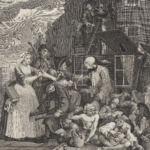 CfP: Ideas of Poverty in the Age of Enlightenment
CfP: Ideas of Poverty in the Age of Enlightenment
5-6 September 2018, King’s College London
Although the Age of Enlightenment saw the development of radically new approaches to the study of society and politics, our current understanding is that the existence of poverty was rarely problematized by eighteenth-century thinkers – notwithstanding that ‘the poor’ made up the vast majority of Europe’s population. This picture only changed in the transformative decade of the 1790s. This conference aims to bring together historians with a wide range of geographical and theoretical expertise to re-examine the ways in which poverty was conceptualised in the social, political and religious discourses of eighteenth-century Europe. It will explore the ways in which the theme of poverty played an important role in critical debates, such as those about sovereignty and representation, public and private charity, as well as crime and punishment.
The idea for the conference was prompted by a sense that the conceptualization of poverty in the eighteenth century was much stranger than might currently be imagined. There appears to have been little sense before the 1790s, for example, that poverty had deeper environmental causes, or on the other hand that it might be the root cause of other afflictions like disease, crime and war. We would like to explore ideas about poverty in the period from a range of methodological perspectives, including intellectual, cultural, social, political, and economic ones. Among the questions that might be addressed are: How far did paternalist assumptions subsume all thinking about ‘the poor’ before the 1790s? Did the political thought of the enlightenment reinforce or undermine those assumptions? How did attitudes to poverty vary in the different states of Europe and how did they change in the period? Why and how did governments and men and women of letters begin to address poverty as a social problem in the 1790s? We would like to invite abstracts for papers of 20 minutes on topics relating to the conference theme.
Abstracts of no more than 300 words and a short biographical note should be directed to both Niall O’Flaherty (niall.o’flaherty@kcl.ac.uk) and Robin Mills (robin.mills@ucl.ac.uk) by 28 February 2018.
Supported by Kings College London Faculty of Humanities Research Grant, the Centre for Enlightenment Studies (KCL), the Royal Historical Society, University College London History Department Events Fund, Kings College London Department of History Research Fund.